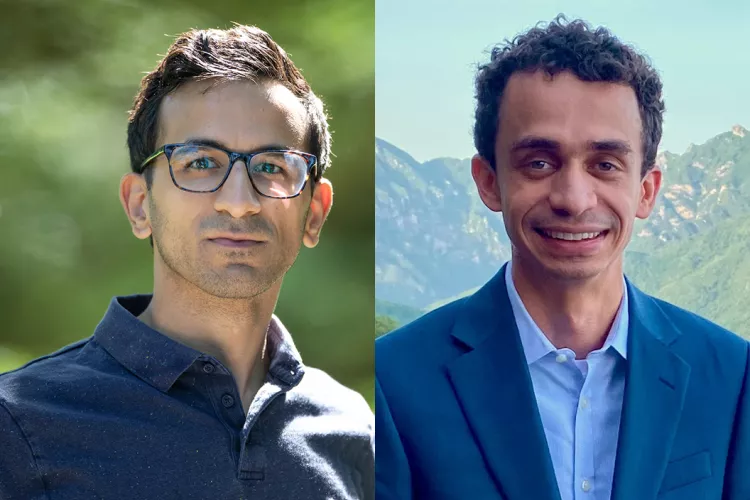Researching the Philly Plastic Bag Ban: A Swarthmore Team Effort

Associate Professor of Economics Syon Bhanot (left) and University of Pittsburgh Economics Ph.D. candidate Daniel J. Banko-Ferran ’17
In 2021, a Philadelphia ban prohibited the retail distribution of single-use plastic bags and paper bags made with less than 40% recycled material. Violators paid a $150 penalty.
Associate Professor of Economics Syon Bhanot and University of Pittsburgh Economics Ph.D. candidate Daniel J. Banko-Ferran ’17 teamed up with the City of Philadelphia to try to better understand the impact of the ban on plastic use. The research team estimated that Philly’s plastic bag ban prevented 200 million bags — enough to fill City Hall with plastic bags every eight months — from being used.
The ban has been met with some public resistance, but Bhanot believes this may decline over time.
“It’s not really that big of a sacrifice to use a reusable bag, but I think that change can be frustrating,” says Bhanot. “My sense is that people will basically get annoyed for two minutes, but ultimately just stick some bags in their car, and then adjust to that new situation.”
It may also be the case that the next generation will be different. Bhanot suspects that “kids will just get used to bringing bags, and the next generation will just become used to doing things a little differently.”
Bhanot has been working with the Philadelphia Mayor’s Office on policy since 2013, using behavioral science to develop interventions addressing public policy issues, like combating litter.
“This ban is the kind of thing that’s happening a lot in cities, so it felt like an important topic, and pretty impactful in the big picture,” says Bhanot, who has worked with policymakers across the U.S. and abroad, from Kenya to Nigeria to Kazakhstan. “I was pretty excited to help the city investigate it more.”
Banko-Ferran has been interested in behavioral and environmental economics since his days as a student of Bhanot’s at Swarthmore.
Banko-Ferran and Bhanot compared changes in Philadelphia consumption to disposable bag behavior to neighboring suburbs, where plastic bag policies had not changed.
A handful of Swarthmore students, partly funded by the Lang Center for Civic & Social Responsibility, worked to collect data for the study.
“I’m thankful to Swarthmore for connecting me with [Bhanot] when I was a student, and also the resources to help recruit these research assistants,” says Banko-Ferran, who was a research assistant for both Bhanot and Associate Professor of Economics Erin Todd Bronchetti during his time at Swarthmore.
The study’s lead research assistant, Emily Dai ’25, an economics and psychology double major from Shanghai, China, pointed out that the opportunity to take part in a field experiment was rare for undergraduate students, especially at liberal arts colleges.
“When I saw that I’d actually get to go on-site and collect observational data of real customers’ behaviors, I got really excited,” says Dai.
Bhanot also noted the value of getting Swatties involved off campus in Philadelphia.
“It was interesting to help students to see that they don’t have to go really far away to find really important, big policy problems and solutions being tested,” Bhanot says. “You don’t have to fly halfway around the world to tackle important social problems.”
The study overlapped with the pandemic, a time when many people prioritized their families and health over environmentalism.
“I think policies like [the plastic bag ban] become especially interesting in environments where people are focused on some other social ill, so don't have the bandwidth to think deeply about their behavior,” says Bhanot. “The fact that the ban had a pretty substantial effect on plastic use is for me a great positive and a great takeaway for policymakers.”
Banko-Ferran and Bhanot, with the help of Dai, are hoping to publish their research in a peer-reviewed journal, and are working now on preparing a manuscript documenting their work and findings.



